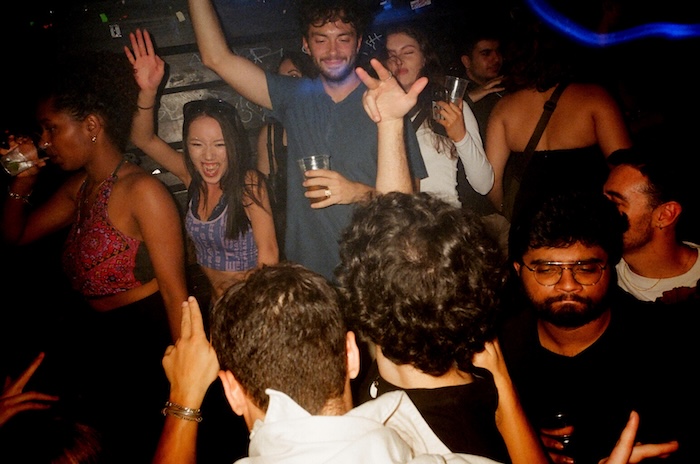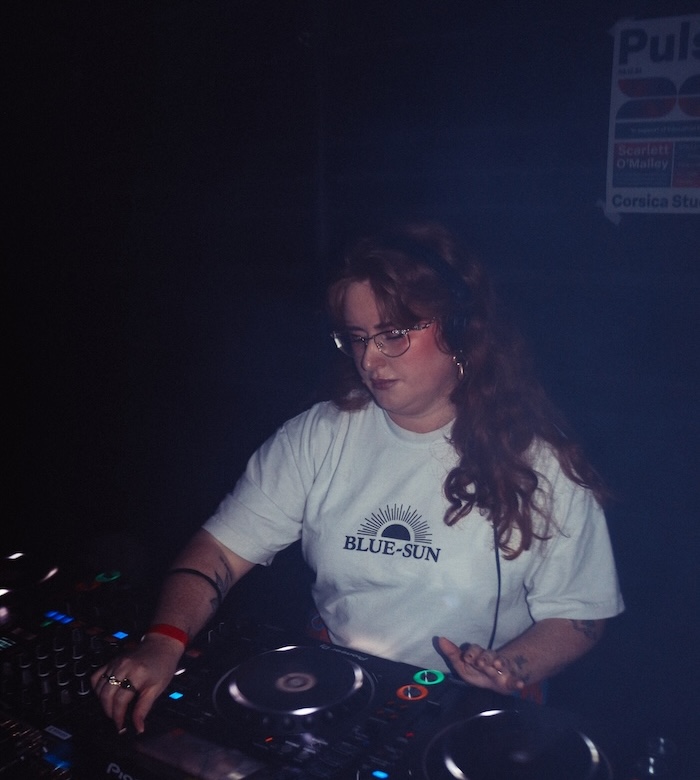Can you give us a brief overview of Pulse and its history at LSE?
Pulse Radio started broadcasting over FM from LSE (London School of Economics) around 30 years ago. We now broadcast online an average of 4 hours every weekday.
Pulse’s initial focus was political interviews and analysis. Around 20 years ago someone bought CDJs and the focus switched to our events. Radio was still there but the focus had shifted.
The radio died down around 5 years ago. Partly due to the struggle of transitioning from FM to an internet station. Partly due to Pulse moving from this very serious style of broadcasting to a more relaxed, culture-focussed initiative.
We’ve been trying to revive the radio side of things, our name is Pulse Radio, after all.
Pulse has always been student run. It used to be funded by the university at some point. Nowadays we’re completely independent. Everything we do is funded by our events. The University doesn't get involved, but we still work with academic departments if they want to record podcasts or collaborate.
What motivated the creation of a student radio station at LSE, and how has that vision evolved?
It was initially motivated by student journalists. The station was a springboard towards careers in broadcast journalism.
Now? Honestly, I think Pulse has become a home for people who aren’t necessarily chasing careers in journalism. Instead, Pulse attracts a lot of interesting, culturally engaged people who love music and want to be part of that world.
Pulse is a creative space at the end of the day. We don't curate what people must play or do. It's an open environment and a space for people to express themselves.
How has Pulse adapted to digital broadcasting and online streaming over the years?
Initially, not well. The transition to digital broadcasting coincided with this culture clash - some people wanted serious broadcast journalism, others wanted that pirate radio spirit. It took a while to figure itself out.
Pulse’s events found their own space and identity and have been doing well. But the radio didn't know what it should be, or even what it could be, which led to it dying off.
The station faced a lot of technical challenges in the beginning. The people who knew about broadcast radio didn't really know much about internet radio. Our setup wasn't designed for internet radio. Because of that, the station didn’t take off as it should. People disregarded radio almost as an afterthought.
In what ways have live events or campus initiatives shaped the station’s identity?
Pulse attracts a certain kind of person. LSE itself is very career driven. Pulse is that one space for people who are into music and culture. A place to congregate that doesn’t feel too outcome focused.
The events did a great job of bringing people together initially. Building on that success, the station became a place where even if you’re not a DJ and you wanted to try your hand, or if you just wanted to bring some friends on air to talk, Pulse became the place where you could do that and share with friends and family.
Even where we broadcast is a community space. I often sit and study outside, and listen while people do their shows, and then speak to them afterwards.
Radio became a community hotspot away from the club nights. The club nights are very sporadic and happen four times a term, but radio is every day. Radio gives Pulse a consistent way of engaging with people.
How does Pulse engage with students and the wider LSE community?
Mainly by giving people opportunities. For most people it's their first time doing radio or DJing. I know a lot of people who've started in a Pulse DJ workshop go on to play at Corsica Studios. Or people with no radio experience going on to have their own weekly show on a separate station.
I think the beauty of it is you can start from nothing and build something from scratch. It’s a space to fall and learn without pressure. You don’t have to be amazing from the moment you start. Even for me, I’d been interested in music and DJing before but I’ve experienced a lot of growth through Pulse.

What kinds of programming or formats have you experimented with that are unique to a student station?
With a student station you have to be ready for anything. You're oftentimes dealing with people with little to no experience in music, DJing or radio. Pulse has to be set up so that someone can arrive, get comfortable and go quickly.
In the beginning when Pulse was a broadcast radio it was strictly talk only. It had mics, an audio console and a transmitter to broadcast live. It kept things very simple.
Nowadays, we need to be ready for one person who wants to DJ, another doing a talk show and interviewing people, someone doing call-ins - all of the above in just one day. It's fun.
We have to be prepared for everything; while dealing with the fact that most people who are using the equipment have probably never used it before. We need to have the tools to be flexible, both technically in terms of hardware and software,
How do you balance academic responsibilities with running a station?
One thing that helps is that everyone at Pulse is really passionate. We’ve become a community which attracts a lot of people who want to get involved behind the scenes just because we do so much.
The great thing is that hosts are proactive about their own shows. We take the approach of we're hosting your show on our platform but it's still your show. We help with marketing and distributing shows but the onus is on the host. Most hosts got their listener base themselves.
So it's partly that people are proactive and we’ve made a space where we get lots of volunteers.
What technology, tools, or platforms have been crucial in making Pulse successful digitally?
One is obviously Radio Cult. Especially in terms of managing broadcasting and letting the show hosts be able to broadcast themselves. Anyone can log in and whether they’re scheduling, archiving the shows, recording the show or even just having all the information about show hosts; having everything being in a central place helps a lot.
RØDE equipment has also been really helpful. Their equipment is very easy to use and understand. We use RØDE for everything: mics, CDJs, people playing their own music on the turntable. All of our equipment is through them. You plug it into your computer and it just works. It’s that easy.

How has Radio Cult supported your station’s growth or helped with operational challenges?
Apart from what I said before, I would also mention how Radio Cult plugs into our website. The embeds are so useful, and the fact that you can customise them to fit your website. That made it really easy. My grandma would want to listen to my show and she's not very well versed in technology. With the embeds, I could just send a link to the website, say press the play button, and that’s it.
The software we used before made everything overly complicated. I think Radio Cult’s simplicity helped us with our listener base as well. People could actually tune in.
Have there been any unexpected challenges in evolving a student station in the digital age? How did you overcome them?
Most hosts don't have prior experience. Even the people behind the scenes who run Pulse don't necessarily have a lot of experience. It was fortunate I had worked in radio before coming to University. But, in general, most people come to Pulse without experience. The station is designed that way so that people can learn and gain experience by doing it. But it is a big challenge.
This is compounded by the turnover rate as people are really only here for three years. The management team of Pulse is here for one or two years only. The station needs to be easy enough so anyone can turn up and understand what to do. Again, Radio Cult helps with that because it’s very easy and intuitive to use.
It’s tough when not a lot of people know how everything works. We’re students broadcasting 4 hours a day on average. We can’t always be available. When we first started the radio up again, people would run into technical issues but we can’t just run out of a lecture. We can’t drop our whole life. We really had to focus on how we can do all of this, broadcast every weekday, give people opportunities, all without it becoming a full-time job.
Like I said earlier, our university doesn’t support us. We’re independent. We fund and manage everything ourselves. That’s a challenge in and of itself. We’re fortunate that our events do well enough to support ourselves. But people do dedicate a lot of time. We’re always coming back to: how do we make this fun for people without it becoming a job? Again, it comes back to the importance of radio, Pulse itself and the platform being a community space. Without that, it wouldn’t work.
What advice would you give to students or other universities wanting to start or grow a digital-first student station?
I would say be open to everything. Some of the people who get into Pulse have interacted with stations with more curated programming, like NTS or Kiosk Radio. For other people, student radio is their first experience with online radio and they’re not into or are not aware of that community radio niche.
We want to balance giving people an opportunity to try and do different things while still trying to have some identity. We want to keep attracting the kind of people that make Pulse great. The best way to do that is by being accessible, beginner friendly and easy to interact with. It’s balancing having space for our core community that gives Pulse its identity without pushing away casual people who might want to give radio a try for the first time.
As President, I try to do all the nitty gritty admin over the summer so that when term starts and people work on Pulse, it's just the fun stuff left - programming, choosing which shows go where and who is playing when - to keep people engaged.
There are always people who enjoy the more nerdy side of things, like myself. I think just knowing who's good at what and letting people do the stuff they enjoy is a big part of it.

What’s next for Pulse? Any exciting initiatives, new formats, or innovations planned?
Pulse’s history is in broadcast journalism and we’d like to pay more homage to that. A lot of student activism happens on campus and Pulse members are a part of it.
Our University had an encampment for Palestine recently. At the time, we used our socials to broadcast Radio Alhara (a Bethlehem radio station actively dedicated to the Palestinian cause). But now that the radio is up and running more, we can be more of a space for journalism. We have a lot of students doing journalism for whom Pulse can be part of the coursework they do for their program
Additionally, lot of LSE academic departments and professors reach out to us to do shows but we’ve always had to say no due to our independence. But we’d like to give a platform to university departments and professors to create their own space through Pulse. I think that would help make Pulse a uni wide thing again.
We also want to do more live broadcasting. We do a lot of events and people can’t always make it. There are a lot of people who might love the music played at our events but maybe they can’t make it or don’t like clubbing. We’d like to make the events more accessible by broadcasting online and letting people listen at home.
We’d also like to do a lot more cross London collaboration. We do events with other universities and we’d like to do more radio collaboration with them. We’d also just like to interact more with London as a city and all the community radio stations that exist in London.
Pulse used to be like a gateway for people to move onto other things. That still happens with our events. Lots of DJs who've done events with us have then gone on to do their own thing. We want the same to happen with the radio, where you can start with your one hour a week journalism podcast and then turn it into something bigger. Like I said, the turnover is quite big, so we don't want people's radio careers to start and end with us.
Where can people listen to Pulse and learn more about what you do?
At our website - you can listen to us under the radio section. We broadcast every weekday.
You can also listen on the Radio Cult app.
We regularly post on our Instagram about broadcasts and events happening.

